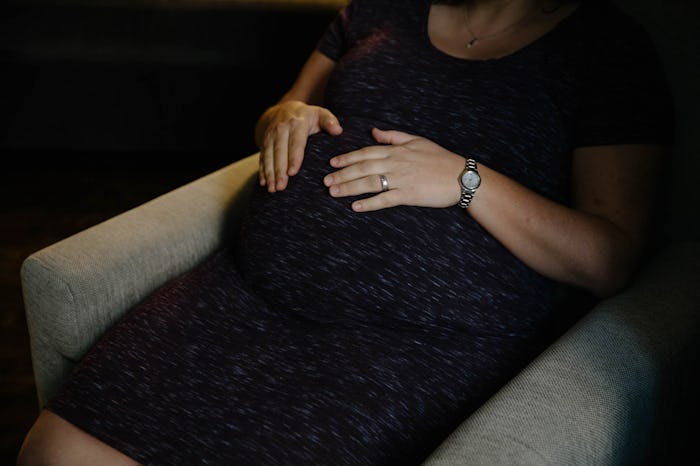Life
Here's The One Red Flag To Look Out For When It Comes To Swelling During Pregnancy
During the glamorous ride that is pregnancy, there are lots of places on your body that will be getting bigger. While some may be welcome (hello, new cup size!), others are likely less so (chipmunk cheeks, anyone?). But most of the enlargement you experience is perfectly healthy. The exception, however, may be actual swelling rather than weight gain. Most gestating women experience some degree of swelling, particularly in the third trimester. This is often just a normal symptom of childbearing, but how do you know when it becomes more? When is swelling during pregnancy a concern? It's an important question to be asking.
According to the Mayo Clinic, your body simply retains more fluid during pregnancy for the needs of your developing wee ones. This increased fluid during pregnancy causes swelling, medically known as edema, usually occurring in the hands, face, legs, ankles, and feet.
So it's all normal and good, right? Not exactly. While a gradual mild swelling is to be expected, sudden swelling in your hands and face — particularly in the second or third trimester — could be a dangerous sign of preeclampsia, or pregnancy-induced high blood pressure, and a serious complication. Any experience of sudden swelling merits more than rest and home remedies; in such cases it's important that you call your healthcare provider right away.
However, if like most women your swelling is within the range of normal, there are a few tried and true ways to keep the worst of it at bay. While nothing will likely completely alleviate it for very long, a little relief can still go a long way.
Chris Brantner, Certified Sleep Science Coach at SleepZoo.com, tells Romper you can actually alleviate pregnancy swelling with your sleep position. "If your swelling isn't serious, one of the best things you can do is lie down on your left side when resting or going to sleep," Brantner advises. "This can improve circulation by removing pressure from the vena cava, the large vein that transports blood from your lower body back to your heart."
In addition to sleep positioning, knowing how to exercise strategically might just be your secret weapon. According to health and fitness expert and founder of BeFit-Mom Helene Byrne, aqua aerobics is the workout most recommended for water retention during pregnancy. "When you do standing exercise in chest deep water," Byrne tells Romper in an exclusive interview, "the hydrostatic pressure of the water on your body pushes fluids through your lymphatic system [and] out of your legs and hips. The contractions of the leg muscle further aid in pushing excessive fluids out of the legs."
Byrne explains that aqua aerobics specifically, rather than swimming in general, is preferred because hydrostatic pressure increases in proportion to the depth of the water. But if you don't have an aqua aerobics class available in your area, Byrne confirms that plain old swimming is, "A good second alternative."
The pregnancy swelling I personally have experienced has been pretty mild, but I have friends who have had to take off their wedding rings and could wear no shoes but their house slippers. There's a big spectrum of normal here. The key to remember is to keep an eye out for swelling that is specifically sudden, as that is often an indicator of a major complication. Otherwise, you can breathe easy. You know, in a huffing and puffing kind of way.
Experts:
Chris Branter, sleep coach
Helene Byrne, prenatal and postpartum exercise specialist
